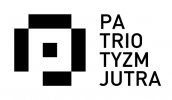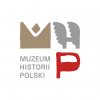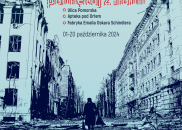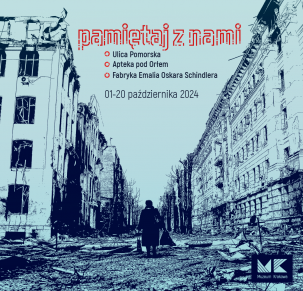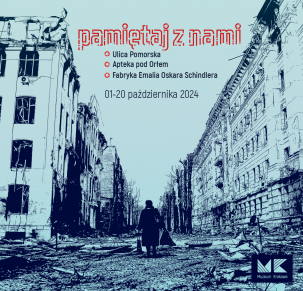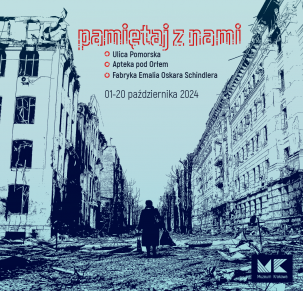2024’s Pamiętaj z nami: remember with us
04.10.2024
- 06.10.2024
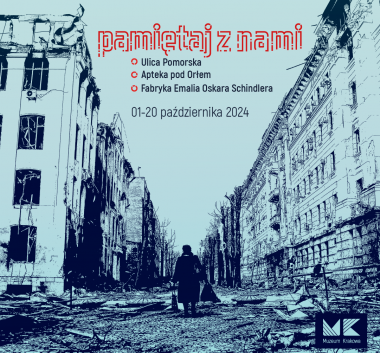
We invite you to explore the program for this year's edition of Pamiętaj z nami (Remember with us), a recurring event organized by the Museum of Krakow since 2012. Between 1st and 20th October 2024, events will take place at three branches of the Memory Trial: Pomorska Street, the Eagle Pharmacy, and Oskar Schindler’s Enamel Factory. The proposed activities will revolve around the central theme of war experiences of refugees from World War II and present-day conflicts, with a special focus on those fleeing Russia's aggression in Ukraine.
The theme will be approached from both an individual perspective and within a broader context, addressing the mechanisms connected to this issue. The chosen theme is deeply rooted in the heritage of the city and its residents, but it naturally extends beyond Krakow. The large influx of Ukrainian refugees since 2022 has posed challenges on many levels for the state and major urban centers during the early weeks of the war. The events will primarily reflect the experiences of Poles and Ukrainians, while also acknowledging political refugees from Belarus and the Middle East.
The project's goals include education, promoting empathy and human solidarity, integrating people from different cultures, as well as fostering memory and social engagement. The event’s audience includes Krakow residents of all ages, the Ukrainian minority in Krakow, international tourists visiting the Memory Trial branches, and residents of the Podgórze and Krowodrza districts where the Memory Trial locations are situated.
The program will feature historical workshops for youth, discussions, lectures, film screenings combined with meetings with Ukrainian creators, the unveiling of a mural created by Polish and Ukrainian artists, an outdoor exhibition at Ghetto Heroes Square, concerts in exhibition spaces, and the theatrical performance "Huljet, huljet" by Teatr Figur Kraków. There will also be meetings with war correspondents reporting on contemporary armed conflicts and representatives of non-governmental organizations helping refugees, guided exhibition tours and culinary workshops integrating Ukrainian, Belarusian and Middle Eastern cuisine. The grand finale will be a concert titled "Wołanie o pokój" (Cry for Peace) at Schindler’s Factory by the international choir, Jednym głosem, accompanied by poetry readings dedicated to wars and refugees, serving as a reflective tribute to the victims of war.
The theme will be approached from both an individual perspective and within a broader context, addressing the mechanisms connected to this issue. The chosen theme is deeply rooted in the heritage of the city and its residents, but it naturally extends beyond Krakow. The large influx of Ukrainian refugees since 2022 has posed challenges on many levels for the state and major urban centers during the early weeks of the war. The events will primarily reflect the experiences of Poles and Ukrainians, while also acknowledging political refugees from Belarus and the Middle East.
The project's goals include education, promoting empathy and human solidarity, integrating people from different cultures, as well as fostering memory and social engagement. The event’s audience includes Krakow residents of all ages, the Ukrainian minority in Krakow, international tourists visiting the Memory Trial branches, and residents of the Podgórze and Krowodrza districts where the Memory Trial locations are situated.
The program will feature historical workshops for youth, discussions, lectures, film screenings combined with meetings with Ukrainian creators, the unveiling of a mural created by Polish and Ukrainian artists, an outdoor exhibition at Ghetto Heroes Square, concerts in exhibition spaces, and the theatrical performance "Huljet, huljet" by Teatr Figur Kraków. There will also be meetings with war correspondents reporting on contemporary armed conflicts and representatives of non-governmental organizations helping refugees, guided exhibition tours and culinary workshops integrating Ukrainian, Belarusian and Middle Eastern cuisine. The grand finale will be a concert titled "Wołanie o pokój" (Cry for Peace) at Schindler’s Factory by the international choir, Jednym głosem, accompanied by poetry readings dedicated to wars and refugees, serving as a reflective tribute to the victims of war.
4th-6th October: POMORSKA STREET
4th October (Friday, 12:00)
Official launch of the urban game "Konspiracja w cieniu swastyki" (Conspiracy in the shadow of the swastika).
4th October (Friday, 15:00)
Guided tour of the permanent exhibition "People of Kraków in Times of Terror" and the history of the Gestapo prison, following the stories of those who, as refugees in 1939 from the Eastern Borderlands, Silesia, and Greater Poland, and in 1944 from Warsaw, found refuge in Krakow and were later repressed by the occupiers.
● Registration required, admission ticket needed.
● Activity is available in Polish.
5th October (Saturday, 16:00 – 17:30)
Lecture "Kraków jako azyl skrzywdzonych przez wojnę" (Krakow as a haven for war victims).
A lecture by Dr. Marcin Horąski (The IPN Historical Research Office in Krakow) discussing the role of Krakow in 1944-1945 as a center of aid for war refugees, Poles expelled by the Germans from various parts of occupied Poland, and those liberated from concentration camps.
● Activity is available in Polish only.
5th October (Saturday, 18:00 – 19:15)
Concert by the Orchestra of the Capital Royal City of Krakow Sinfonietta Cracovia performing live music in the "People of Kraków in Times of Terror" exhibition space, accompanied by the reading of testimonies from Polish war refugees.
● Activity open to all visitors.
6th October (Sunday, 17:00)
Discussion panel "Losy polskich uchodźców wojennych w okresie II wojny światowe i opowieści o nich" (The fate of Polish war refugees during World War II and their stories).
The meeting will address the situation of refugees from territories annexed by the Third Reich in 1939, Volhynia in 1943 and Warsaw in 1944. The discussion will explore the reasons for their flight, the differences and similarities in their circumstances, and the psychological consequences of being expelled from their homeland. Additionally, the session will cover the challenges of presenting these narratives in museum exhibitions.
Panelists and topics:
● Refugees from areas annexed by the Third Reich in 1939: Mariusz Gratkowski.
● Volhynia in 1943: Tomasz Potkaj.
● Warsaw in 1944: Fundacja Ośrodka KARTA.
Moderator: Grzegorz Bernasik (Radio Kraków). Activity is available in Polish only.
4th October (Friday, 12:00)
Official launch of the urban game "Konspiracja w cieniu swastyki" (Conspiracy in the shadow of the swastika).
4th October (Friday, 15:00)
Guided tour of the permanent exhibition "People of Kraków in Times of Terror" and the history of the Gestapo prison, following the stories of those who, as refugees in 1939 from the Eastern Borderlands, Silesia, and Greater Poland, and in 1944 from Warsaw, found refuge in Krakow and were later repressed by the occupiers.
● Registration required, admission ticket needed.
● Activity is available in Polish.
5th October (Saturday, 16:00 – 17:30)
Lecture "Kraków jako azyl skrzywdzonych przez wojnę" (Krakow as a haven for war victims).
A lecture by Dr. Marcin Horąski (The IPN Historical Research Office in Krakow) discussing the role of Krakow in 1944-1945 as a center of aid for war refugees, Poles expelled by the Germans from various parts of occupied Poland, and those liberated from concentration camps.
● Activity is available in Polish only.
5th October (Saturday, 18:00 – 19:15)
Concert by the Orchestra of the Capital Royal City of Krakow Sinfonietta Cracovia performing live music in the "People of Kraków in Times of Terror" exhibition space, accompanied by the reading of testimonies from Polish war refugees.
● Activity open to all visitors.
6th October (Sunday, 17:00)
Discussion panel "Losy polskich uchodźców wojennych w okresie II wojny światowe i opowieści o nich" (The fate of Polish war refugees during World War II and their stories).
The meeting will address the situation of refugees from territories annexed by the Third Reich in 1939, Volhynia in 1943 and Warsaw in 1944. The discussion will explore the reasons for their flight, the differences and similarities in their circumstances, and the psychological consequences of being expelled from their homeland. Additionally, the session will cover the challenges of presenting these narratives in museum exhibitions.
Panelists and topics:
● Refugees from areas annexed by the Third Reich in 1939: Mariusz Gratkowski.
● Volhynia in 1943: Tomasz Potkaj.
● Warsaw in 1944: Fundacja Ośrodka KARTA.
Moderator: Grzegorz Bernasik (Radio Kraków). Activity is available in Polish only.

